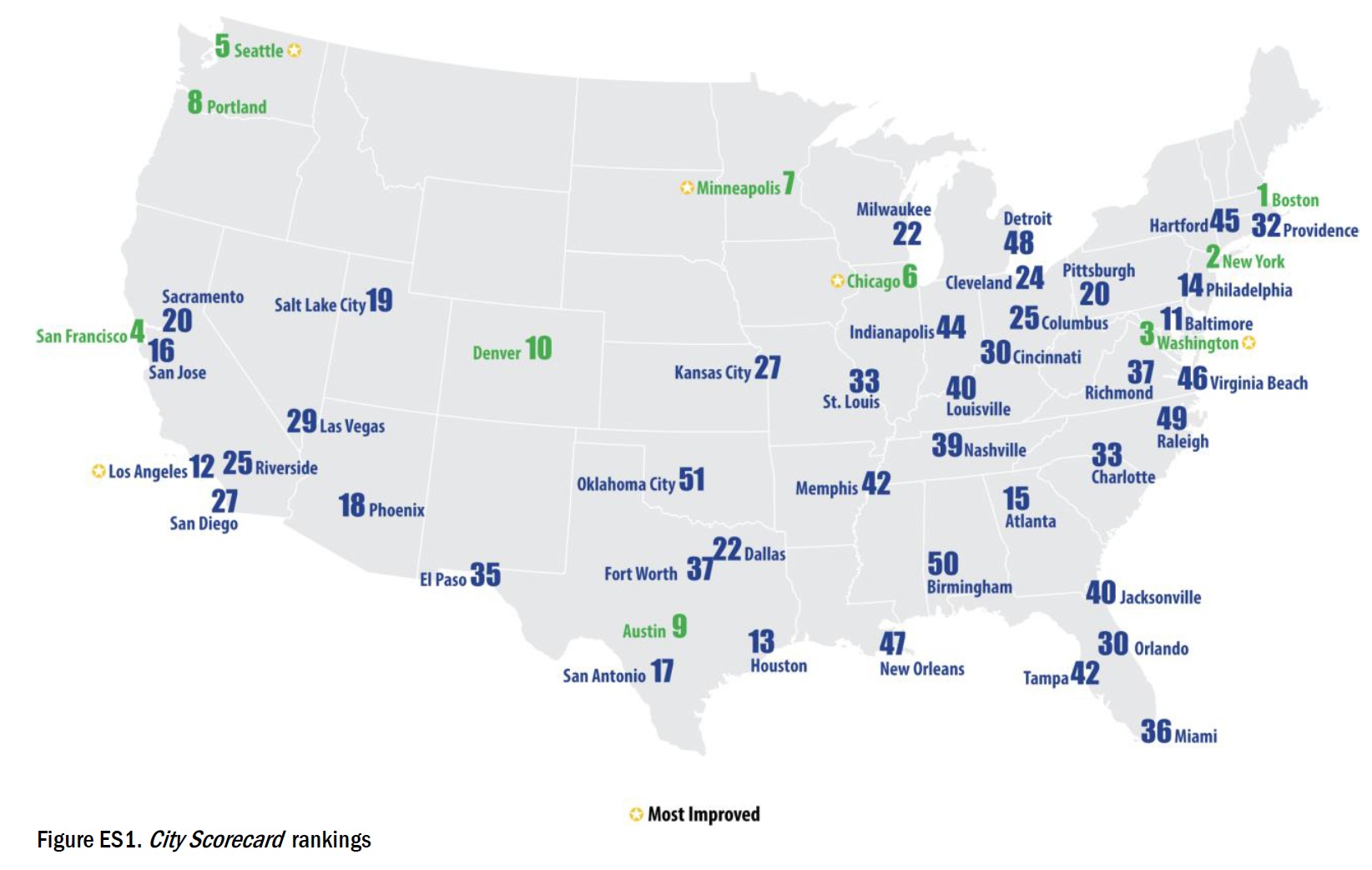AMERICAN COUNCIL FOR AN ENERGY-EFFICIENT ECONOMY (ACEEE)
Executive Summary
Energy efficiency is one of the least expensive, most abundant, and most underused resources for local economic and community development. Saving energy can make communities more resilient while protecting human health and the environment. Energy efficiency investments also save money for households and businesses, catalyze local reinvestment, and create jobs in the community.
Many local governments around the United States are committed to efficiency. Cities can influence energy use in their communities in many ways: through land use and zoning, building codes, public finance, transportation investment, economic and workforce development, and in many cases, the provision of water and energy. Local and metropolitan energy efficiency initiatives provide visible benefits for residents, directly improving the communities where they live and work.
The 2015 City Energy Efficiency Scorecard compiles information on policies and local actions to advance energy efficiency, comparing cities across five policy areas. This second edition of the City Scorecard ranks the cities included in the first edition and adds a new group of large cities, for a total of 51.1 To reflect the current and near future policy environment, the City Scorecard considers both policies that have already been implemented and ones that been adopted but not yet put into practice. We identify cities that are excelling and those that have room for improvement. Throughout the report we give examples of best practices used by leading cities. Our goal is to provide a roadmap for local governments aiming to improve their cities’ energy efficiency.
KEY FINDINGS
The 2015 City Energy Efficiency Scorecard compares cities across five policy areas:
- Local government operations
- Community-wide initiatives
- Buildings policies
- Energy and water utilities
- Transportation policies
Figure ES1 shows how cities ranked overall.
As in the last edition, Boston earned the top spot in the 2015 City Scorecard. It received 82 out of a possible 100 points, an improvement of more than 5 points from its 2013 score. Boston scored well across all policy areas, and it excelled in both buildings and in energy and water utilities. Boston has expanded its incentives and financing opportunities for energy-efficient buildings and implemented energy benchmarking requirements. The city continues to have strong utility partnerships, including the Renew Boston Initiative.
Joining Boston in the top five are New York City, Washington, San Francisco, and Seattle. All have wide-ranging efficiency policies and programs and a history of implementing efficiency initiatives. They all have closed the gap with top scoring Boston by scoring at least 75 points. The top five cities were separated by 11.5 points in the 2013 Scorecard. This year they are separated by 7 points.
Rounding out the top ten are Chicago, Minneapolis, Portland, Austin, and Denver. With another top-ten showing, Chicago, Minneapolis, Portland, and Austin continue to demonstrate their commitment to efficiency. Denver entered the top ten for the first time.
Washington, Los Angeles, Chicago, Minneapolis, and Seattle were the most-improved cities compared to the last edition, with many showing double-digit scoring improvements. The increased availability of their policy data accounted for some of their improvement, but these cities also have made real strides in efficiency. Chicago, for example, enacted a new commercial benchmarking ordinance. Los Angeles is another good example. Whereas California requires municipal utilities to achieve 10% of their supply through energy efficiency by 2023, Los Angeles’ municipal utility adopted a more stringent target of 15% by 2020.
Download full version (PDF): 2015 City Energy Efficiency Scorecard
About the American Council for an Energy-Efficient Economy (ACEEE)
www.aceee.org
The American Council for an Energy-Efficient Economy (ACEEE), a nonprofit, 501(c)(3) organization, acts as a catalyst to advance energy efficiency policies, programs, technologies, investments, and behaviors. We believe that the United States can harness the full potential of energy efficiency to achieve greater economic prosperity, energy security, and environmental protection for all its people.
Tags: ACEEE, American Council for an Energy-Efficient Economy, Energy efficiency







 RSS Feed
RSS Feed